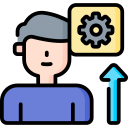
Assessing Your Digital Literacy Skills: A Self-Evaluation Guide
Chosen theme: Assessing Your Digital Literacy Skills: A Self-Evaluation Guide. Welcome! This friendly guide helps you reflect on the way you search, verify, communicate, secure, create, and learn online. Explore practical prompts, real-world examples, and gentle checklists that turn reflection into confident action. Comment with your current challenge and subscribe for monthly self-check prompts.
What Digital Literacy Really Means Today
Map your skills across six areas: information evaluation, search strategy, device and security hygiene, communication and collaboration, creative production, and data awareness. Balanced growth matters more than perfection in any single category, and honest reflection unlocks practical next steps.


What Digital Literacy Really Means Today
Maya once felt overwhelmed by endless newsletters and misleading headlines. By pausing to verify sources and refining searches with operators, she halved her reading time while doubling confidence. Her secret was weekly, fifteen-minute self-checks.
List three tasks you do online weekly, like researching, sharing documents, or managing passwords. For each, rate confidence and friction on a five-point scale. Capture examples that felt confusing, and note what made them difficult.
Set Up Your Personal Baseline
Sketch a quick radar chart with axes for search, credibility checks, security, communication, creativity, and data sense. Low scores are opportunities, not failures. Revisit this map monthly to watch your confidence expand.
Set Up Your Personal Baseline
Evaluate Your Information Savvy
01
Spotting credible sources
Check author credentials, publication reputation, citations, and update history. Look for original data and clear methodology. When in doubt, compare claims across independent outlets, and document your go-to reliable sources for future reference.
02
Search strategies beyond page one
Use quotes for exact phrases, minus signs to exclude terms, filetype filters for PDFs, and site-specific searches for authoritative domains. Try multiple queries that reflect different angles of the same question to broaden perspective.
03
Fact-checking flow that fits your day
Adopt a quick loop: read, pause, verify, cross-reference, then decide. Build a small bookmark folder with fact-checking sites and transparency reports. Five focused minutes can prevent hours lost to misleading claims and confusion.

Judge Your Communication and Collaboration Online
Tone, context, and audience awareness
Before sending, ask: who reads this, what do they need, and how might it land? Replace ambiguous phrases with specifics. Include a helpful subject line, clear ask, and expected timeline to reduce back-and-forth.
Tool fluency in docs, boards, and chats
Learn one powerful feature per tool each week: comments, version history, templates, or shortcuts. Small improvements compound, making collaboration smoother and deadlines less stressful. Share your favorite tip in the comments.
Digital citizenship and community impact
Cite sources, credit collaborators, and model respectful disagreement. Healthy communities form when we reward evidence, curiosity, and patience. Pledge one behavior you will exemplify this month and invite a friend to join you.
Measure Your Creative and Data Skills
Visual storytelling basics
Use contrast, hierarchy, and whitespace to guide attention. Replace text-heavy slides with clean visuals and speaker notes. Test your narrative with a peer: can they summarize your message in one sentence after thirty seconds?
Data literacy essentials
Clarify the question before charting. Pick chart types that match relationships, not habits. Label clearly, show uncertainty when needed, and avoid deceptive scales. Document your assumptions and invite challenges to strengthen conclusions.
Automation and AI as co-pilots
Treat automation as a helper, not a crutch. Outline tasks, set quality criteria, and verify outputs with source links. Keep a learning log of prompts and results to steadily improve reliability and speed over time.
Plan Your Growth Path and Stay Accountable
Choose three goals tied to gaps you discovered, like improving fact-checking speed or implementing a password manager. Make them specific, measurable, and realistic. Put recurring reminders on your calendar to review progress.
Plan Your Growth Path and Stay Accountable
Join a forum, cohort, or local meetup where people share workflows and lessons learned. Ask one thoughtful question weekly. Teaching one concept back to others cements your understanding and grows your network.

